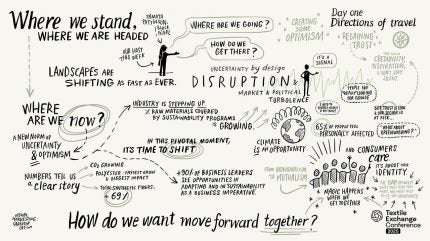
In the opening session, Textile Exchange CEO Claire Bergkamp and Kantar’s Sustainable Transformation Practice managing partner Jonathan Hall acknowledged both the progress made and the scale of the transformation still needed, offering two complementary perspectives: The urgency of the climate and nature agenda, and the broader market forces influencing how businesses adapt.
The session framed the challenges ahead while emphasising the importance of collaborative, forward-looking action.

Discover B2B Marketing That Performs
Combine business intelligence and editorial excellence to reach engaged professionals across 36 leading media platforms.
Hall said the data gives us reasons to be positive, and that when we dig beneath the noise, “it’s clear consumers still care,” with 67% of people still believing environmentalism is extremely important because of the increasing frequency, intensity, and critically, the proximity of climate change impacts.
The event also saw Deb Chachra, author of How Infrastructure Works, offer insights into the structural levers needed to unlock large-scale transformation.
Textile Exchange chief standards and strategy officer Ashley Gill presented the theory of change and five-year strategy, emphasising how a shift toward preferred production systems can deliver measurable impact across the fashion sector.
The top five takeaways from Textile Exchange Conference Day 1
- From preferred materials to preferred systems
A panel representing farmers and material producers discussed how the focus on preferred materials needs to shift to preferred production systems, enabling a more outcomes-driven, holistic approach. Attendees heard how this will better reflect where the impacts occur and will recognise the interconnectivity of impacts affecting climate, nature, people, animals, and governance. This shift will allow the industry to set a clear vision and pathways toward resilient, regenerative, and circular production practices, without relying on rigid material classifications.

US Tariffs are shifting - will you react or anticipate?
Don’t let policy changes catch you off guard. Stay proactive with real-time data and expert analysis.
By GlobalData- Both impact data and the way it’s collected must be context specific and accessible
A number of the sessions considered how high-quality, transparent, and region-specific data is critical for setting realistic goals and enabling systemic change. There was a deep dive into impact data for cropping production systems as well as a broader look at where the future of outcome measurement is headed. Tools like Life Cycle Assessment (LCA) must be applied thoughtfully, with awareness of limitations, within a holistic approach that includes impacts such as biodiversity, soil health, and livelihoods. Making this data accessible to all stakeholders, from farmers through to brands, is critical to driving change we can measure.
- Progress demands collaboration and systems thinking
Achieving goals requires shared investment, cross-supply-chain collaboration, and aligned sourcing decisions. One of the themes of the sessions was how organisations must view themselves as part of interdependent networks, recognising partners, not just transactions, across the whole supply chain. When the supply chain speaks a common language, alignment and co-development can create solutions that enable transformation at scale.
- Economic and environmental models must align, and textile-to-textile recycling offers one clear unlock
By combining economic and impact modelling, we can map out tangible pathways toward regeneration-led growth, where business objectives support, rather than compete with, sustainability goals. Textile-to-textile recycling presents one clear opportunity to get there, reducing reliance on virgin resources and unlocking the value in knowing where our waste ends up and the ways we can repurpose it. Attendees dived into the details of post-consumer waste streams by country, exploring business strategies centred on building reverse logistics and adopting circular business models.
- Standards and outcome measurement drive accountability and progress
Standards are not just verification tools, they’re frameworks for strategy, collaboration, and shared learning. Panelists discussed how measuring outcomes must be relevant, transparent, and integrated into continuous improvement cycles. While misalignments still exist (for example, between brand expectations and what farmers can actually measure), it was stressed that it’s important not to feel intimidated by complexity and to start implementing outcome measurement methods, as collective action and clear metrics are essential to scaling preferred production systems.





